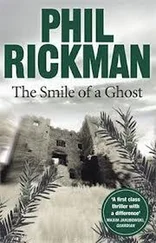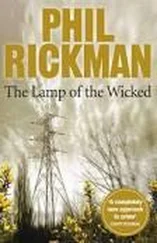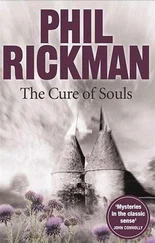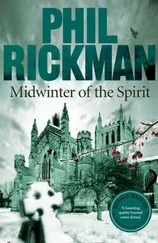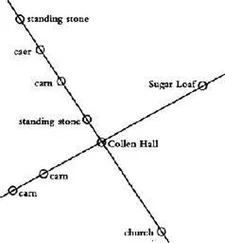‘What ...?’ She couldn’t hold it back. ‘You just confessed to a murder!’
‘ Confessed? ’
Lloyd stormed into the cider house, kicked the door shut with his heel.
‘You calling me a common criminal, miss? Like it was wrong to stop that woman spreadin’ her filth and lies and undermining a stable community built on respect? That’s what’s criminal, Jane.’
He towered over her, one foot half over both of hers. She cowered instinctively, which seemed to excite him.
‘Father en’t back soon,’ he said. ‘I en’t gonner wait.’
‘Why don’t you go and look for him?’
‘Shut your mouth, Jane, before I ...’
He stepped back and pulled something out of his jeans. Jane screamed.
‘Only my mobile, Jane.’ Lloyd opened the phone and moved closer to the fluorescent tube. ‘I phoned him twice, but he won’t take his phone into church, see. Not respectful’
He stabbed out the number and waited, with the phone at his ear. ‘Come on, Father, come on. Funny thing ...’ She saw his mouth twist in amusement over the lip of the mobile. ‘I thought you were a bit different at first. Even thought you might make a wife in a year or two. Funny how first impressions can be deceiving.’
‘It was Lucy Devenish who put us on to it,’ Merrily said. ‘Though I suspect it was me coming here that put Lucy on to the idea. I don’t think she could prove it, but she was expecting it to be proved. The arrival in Ledwardine of a female minister ... Well, she seems to have thought that would set something off, and perhaps it did. Certainly in the vicarage. But that’s ... I’ll come back to that, if I can.’
The amazing thing was not that everybody she’d looked at – including James Bull-Davies and Alison Kinnersley – had shown genuine surprise, but that nobody out there now looked sceptical. Most were clearly intrigued. Bull-Davies seemed confused and unhappy. Only Garrod Powell, as usual, was expressionless.
Merrily felt strangely and completely relaxed. All the pressure had lifted from her chest. She was not nervous. Her breathing was even.
‘There’s no reason to doubt that the person who became Wil Williams was indeed a protegee of Susannah Hopton, of Kington, having been introduced to her in the 1660s. It seems more likely to me that Mrs Hopton would have taken a girl into her house than a man. And a hard-up Radnorshire hill farmer would be rather more likely to spare his daughter than his son. Certainly Mrs Hopton would have been fascinated by someone so utterly committed to the Christian life that she was prepared to abandon her womanhood for it.’
‘Let me get this right, Mrs Watkins,’ Bull-Davies said. ‘You are suggesting that Williams managed to con his – or her – way through university and bamboozle the Church of England into accepting her as a man, and then went on to practise as a clergyman for several years without once—’
‘Yes.’
‘It’s ridiculous. No one would get away with it.’
‘Have you heard of Hannah Snell, James?’
‘Should I have?’
‘Hannah Snell was born in Worcester about a century after Wil Williams. She made a name for herself on the London stage, singing songs and telling tales of her bizarre life which began – the bizarre part – when her husband, a Dutch sailor, disappeared. Hannah went off to try and find him. Joined the army, later the Marines. Travelled as far as India. Was obliged, on occasion, to share abed with servicemen and was also, allegedly, stripped to the waist for a flogging. During all that time, nobody seems ever to have spotted she was a woman.’
‘That’s true,’ Jim Prosser shouted. ‘A fact, that is. And she wasn’t butch, neither, apparently.’
Merrily said, ‘And there was nothing about this in the Bull journal? They must have discovered the truth about Wil after death, at least.’
‘Nothing that I could see,’ Alison said. She’d left her seat at the back and moved to the choir stalls, possibly to observe James’s reaction. ‘It concerns the death itself more than anything.’
James looked sullen again.
‘We’ll come to that,’ Merrily said. ‘I’m just trying to show that if Hannah Snell could pass herself off as a front-line fighting man for over five years, then it would certainly be possible for a young woman to get through college and become ordained and serve as a priest. Especially if she had the support of people of the order of Susannah Hopton and Thomas Traherne.’
Merrily switched off the microphone, leaned over the pulpit.
‘Look, we know hardly anything about the real Wil Williams and I doubt we’re ever going to. We presume she went to Oxford as a man – perhaps there are records, I don’t know. We can only speculate. About many things. Like why the estimable Thomas Traherne, who so loved Hereford and delighted in the countryside, should have gone so readily to London. Perhaps he too was in love and knew better than anyone why it was doomed.’
‘That’s an enchanting thought,’ said Mrs Goddard, the crippled horsewoman. ‘He never married, you know. He died at thirty-seven.’
Bull-Davies snorted. Merrily wondered whether Lol Robinson, who was also thirty-seven, knew that Traherne had died at precisely that age. She was suddenly worried about Lol. And Jane. She would have to end this soon.
‘What must it’ve been like for her, though?’ Effie Prosser said. ‘A woman alone in that big vicarage, pretending to be a man.’
Merrily thought for a moment before responding.
‘I know exactly what it was like.’
‘You’re really a man, are you, Mrs Watkins?’
‘Mr Davies,’ said Mrs Goddard, ‘I’m getting rather tired of the sound of your voice. Please go on, Mrs Watkins.’
‘Well, she wouldn’t have been alone,’ Merrily said. ‘That’s the first point. Ministers in those days, I gather, were rather more up-market than they are today. So there would have been servants. Certainly other people in that house from whom she would have had to hide the truth. Can you imagine the problems that would cause? She’d have no privacy in her own house. Except ...’
Merrily no longer wanted to be in the pulpit. She wanted to be a woman, not just a minister. She came down and sat on the chancel steps, as Stefan, as Wil, had done.
‘... except in the attic. I ... feel ... that the attic was the only place where she felt free to be a woman. Even her bedchamber on the first floor would have been cleaned and tidied by a maid. So it would have to be a masculine room. When I’m on that floor, particularly, I sometimes sense a ... constriction. Perhaps I imagine that. Perhaps it’s psychological’
‘Or perhaps you are psychic,’ said Mrs Goddard brightly.
Merrily tried to look dubious.
‘I feel she went through quite a lot of pain, both emotional and physical, flattening her chest, deepening her voice, never daring to show herself in public without the bindings or corsets or whatever she wore. Unlike Traherne, she couldn’t go out in the countryside with any sense of freedom. She couldn’t even go into her beloved orchard and just be herself, without the risk of being seen.’
The images were coming to her as she spoke. She felt she was quivering with vision.
‘So she made a place for herself. A dark, secret place, where she could perhaps keep women’s clothes. Parade at night in the flimsiest, most frivolous of dresses. And weep. Silently, of course. Always silently. In the attic of the vicarage.’
I saw her. Oh my God, I saw her.
‘I ... It’s funny ...’ She looked up. ‘My daughter, Jane, was drawn to the attic from the moment she entered the house. I was thinking what a miserable, draughty-looking house it was, and Jane was dashing upstairs and claiming the attic for herself.’
Читать дальше



